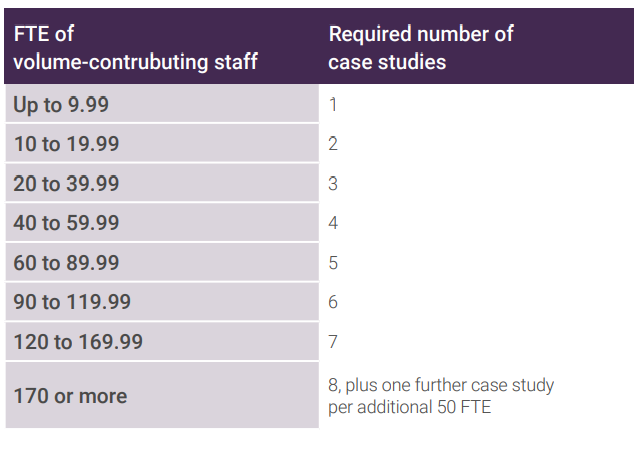Preparing for REF2029
In June 2023, Research England published their Initial Decisions on REF 2029. Since then, there have been a number of updates following a consultation analysis in spring 2024. Further guidance is expected throughout the autumn and winter of 2024. Key changes since REF2021 are summarised below.
REF Strategy Group have developed an internal timeline of institutional checkpoints aligned with Research England's timetable to ensure a coordinated preparation of the REF 2029 submission.
This page will be updated continually.
What's new in REF 2029?
Staff data
The submission will not include a staff list.
Instead, the volume measure for REF 2029, which determines our number of outputs and impact case studies submitted, will be calculated using data taken directly from the HESA Staff record.
This data will be based on the average FTE of Teaching and Research contracts with significant responsibility for research, and Research-only contracts of independent researchers, over the course of two years.
Eligibility criteria can be found in the volume measure guidance.
The HESA Staff record will be updated to include information about REF eligibility and Unit of Assessment allocation. We will be working closely with Heads of Departments and REF Leads throughout the assessment period to ensure that the HESA Staff record is correct and up to date.
More details can be found on the volume measure explainer page.
Engagement and Impact
In order to recognise and reward a wider range of impact-enabling activities, the ‘impact’ element will be expanded to include ‘Engagement and Impact’. This element will contribute 25% to the overall quality profile. Guidance for the Engagement and Impact element is expected in Summer 2025.
Engagement and Impact submissions will consist of both impact case studies and a narrative statement which will be worth at least > 20% of the Engagement and Impact scoring.
The number of impact case studies that UoAs will need to submit will be based on the volume measure.

The underpinning research outputs for impact case studies will no longer have a requirement of 2* quality (but will still need to be research). “Rigour” is also being considered as an additional criterion for assessment in addition to “reach and significance.”
Other than those changes noted above, the rules around impact case studies are expected to be largely the same as for REF2021. Authors preparing impact case studies are referred to the Guidance on Submission for REF2021 until REF2029 guidance is available.
While guidance on the narrative statements is also forthcoming, the statements may be an opportunity to: 1) outline how the Unit supports a healthy impact culture; 2) detail engagement activity within the Unit underpinning impact; and 3) describe other impacts not reflected in the impact case studies.
Outputs
Research England want to break the link between individual staff members and unit submissions. That means outputs no longer have to be attributed to REF-eligible staff. However, outputs produced by individuals employed on teaching-only contracts are not eligible for submission.
Outputs need a link to the institution via the employment contract of at least one of its authors. Outputs are no longer portable, as the author's employment contract needs to coincide with the output's publication date. For more details, or to discuss individual cases, please contact the Research Excellence Manager, Sanna Melin Schyllert.
Output review is expected to start in 2025. For more information on how to engage Critical Friends, see our guidance notes.
People, Culture and Environment (PCE)
The environment element is rebranded as "People, Culture and Environment" and will contribute 25% of the overall quality profile. Details of the data and evidence requirements are yet to be announced.
UoY was selected to take part in the pilot exercise of the PCE element. The exercise called for feedback on a large number of indicators and metrics, and their suitability for use in REF2029. UoY submitted at institutional level and in three Units of Assessment:
-
UOA 5: Biological Sciences
-
UOA 11: Computer Science and Informatics
-
UOA 20: Social Work and Social Policy
The submissions for the PCE pilot are assessed from mid-March 2025 until the end of 2025. Research England published the PCE pilot guidance on 14 January 2025.
Open Access
For REF 2029 there will continue to be an open access requirement for journal articles and conference proceedings. There is no open access requirement in REF 2029 for any other output types (eg longform outputs, including monographs, book chapters and scholarly editions).
From 1 January 2026, outputs subject to an embargo are required to be deposited in the WR repository within three months of publication.
From 1 January 2026, the allowed embargo periods are shorter than before: six months for outputs submitted to main panels A and B, and 12 months for outputs submitted to main panels C and D.
The implementation date for the revised policy is 1 January 2026. The REF 2021 Open Access Policy submission requirements apply until succeeded by the new policy.
The full Open Access Policy for REF 2029 was published on 11 December 2024.
You can find more information about Open Access at York on the Library's webpages.
REF advisory panels
The members of the Research Diversity Advisory Panel (RDAP) and the People and Diversity Advisory Panel (PDAP) were announced in October 2024.
The RDAP will develop strategies to support the equitable recognition of diverse forms of research within REF 2029 development, delivery and assessment.
The PDAP will develop strategies to support recognition of a diversity of roles, careers and career stages within REF 2029 development, delivery, and assessment and to advance equality, diversity, and inclusion (EDI) throughout REF 2029.
What's next?
Research England will release policy modules covering Contribution to Knowledge and Understanding (ie outputs) and Engagement and Impact in spring/summer 2025.
This page will be updated as and when new guidance is published.
Further information
REF 2029 News from Research England
REF 2029 Timetable from Research England
REF Strategy Group: Terms and membership
How to engage Critical Friends (HR pages)
